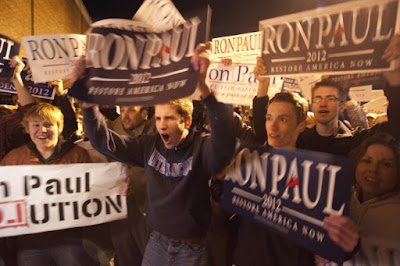Remember during the election for pres on nov 12 a vote for Ron Paul is a vote for Obama. I think Ron will be voting for the republican candidate himself because he does not like Obama either. I am just saying make ur vote count and don't pencil in Ron Paul and waste a vote to get Obama out of office.My response to this status turned into my previous post on how the GOP can't win without a Ron Paul nomination. My conclusion: "If, on election day, Ron Paul has to be written onto the ballot by voters then the GOP has already lost." Furthermore, a vote for Mitt Romney IS a vote for Barack Obama.
In 1992, George H. W. Bush was the first of the modern moderate neocon losers. Sure, he talked "family values" but everyone knew from his record that he wasn't actually socially conservative. During his Vice-Presidency, and before, he was pro-choice, and his fiscal policies were moderate, at best. He won in 1988 on the momentum, albeit fading, of the Reagan Revolution and because he was running against a Massachusetts Governor named
In 1996, Bob Dole was the next moderate trotted out. Only this time he was running against an incumbent Democrat who had a mildly rocky first term and whose party lost big in the mid-term elections. That doesn't sound familiar at all. Bob Dole inspired zero enthusiasm in the Republican party getting 22% fewer votes than George W. Bush did 4 years later. The Dole nomination, like the Romney candidacy, had an air of inevitability to it, as if it was finally his turn. Nobody was excited by him. But Dole's claim was that he had the best chance to beat Clinton. Here is some news coverage from the time:
"The results boosted Dole's claim that he has the best chance to beat Clinton as 3,400 delegates and hordes of national media prepared to gather in Orlando this weekend for Presidency III, the Florida Republican straw poll."
And the GOP voters fell for it. Dole lost by almost 10% in the popular vote and 40% in the electoral vote. It was a resounding defeat.
The GOP changed their strategy somewhat in 2000 and ran on a far less moderate, less neocon platform. George W. Bush promoted a "humble foreign policy", a pro-life agenda, reduction in the size of government, across the board tax cuts and so on. And while it was a close race, he ultimately prevailed. Unfortunately he turned out to be one of the biggest spending, big government, military adventurists of a generation after 9/11. During his administration, the neocons became the dominant force in the Republican party. Their rise to power culminated in the nomination of John McCain in 2008.
 I don't need to spend much time on McCain. Most people can remember back 4 years and the dismal failure that was McCain-Palin. The bottom line is that he was very moderate, very "electable" and he lost by 10,000,000 votes to Barack Obama. The worst defeat in electoral votes by any presidential candidate (including a politician from Massachusetts named
I don't need to spend much time on McCain. Most people can remember back 4 years and the dismal failure that was McCain-Palin. The bottom line is that he was very moderate, very "electable" and he lost by 10,000,000 votes to Barack Obama. The worst defeat in electoral votes by any presidential candidate (including a politician from Massachusetts named So back to the Facebook status at the top. The message is that if Ron Paul is written in on a ballot, it is a vote for Obama. The exact opposite is true. Writing in a vote for Ron Paul, if it comes to that, is a vote against Obama. It's also a vote against the moderate, neo-Conservative candidates that the GOP keeps trying to push forward that can't win. In the last 20 years, they've proven time and time again, that going with the moderate, the guy with the perceived Best Chance to Beat the incumbent democrat or the guy who whose turn has finally come is the way to lose. But somehow we are supposed to believe that this time is different. It's not. A vote for Mitt Romney is a vote for Barack Obama.
-Addendum: I didn't talk about Ross Perot (what is it with Texans bearing the initials RP?). But in the case of the Dole defeat, you could move every single vote for Perot over to Dole and he still would have lost the popular election and the electoral vote. In the 1992 race, Perot likely did change the outcome. However, his biggest issue, NAFTA, captured a lot of typically Democrat union votes, so it isn't totally clear that Bush would have won. You could make an argument that Perot could have defeated Clinton if he had been the GOP nominee. But with Bush being the incumbent and pushing Perot to a third party, he didn't stand a chance for victory. Paul is not going third party and there isn't an incumbent Republican. So, I would argue that a Romney nomination splits the vote that would otherwise go to Paul.






